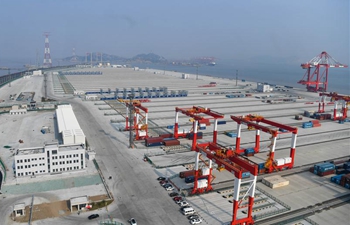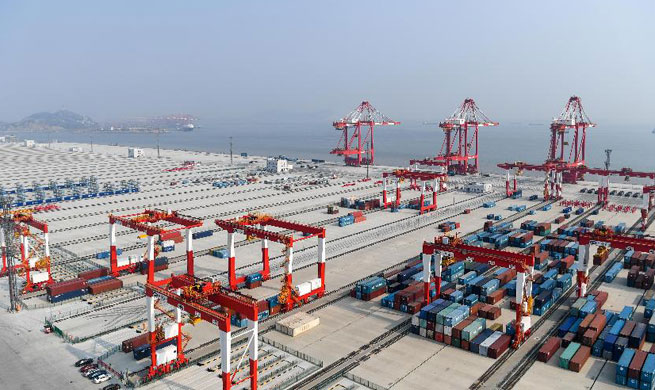BEIJING, July 26 (Xinhua) -- This year marks the 200th anniversary of the birth of bikes. Every day millions of Chinese still ride them to work or go shopping. However, they no longer open bikes with keys, but by smartphone apps.
It is not only bikes. By scanning QR codes in stations and restaurants with a smartphone or logging in to one of thousands of mini-sites on Tencent's instant-messaging app WeChat, users can access and rent everything from sports equipment and washing machines, to umbrellas and cars.
The sharing economy, which is now re-shaping the life of millions, did not come out of nowhere. Behind it was years of technological development and industrial upgrading.
China's sharing economy witnessed a total transaction volume of 3.45 trillion yuan (511 billion U.S. dollars) last year, more than doubling that of 2015, which involved more than 600 million Chinese, according to a report released by the State Information Center in March.
NEW GROWTH DRIVERS
To seek new growth drivers and accelerate economic transformation, the government has been actively pursuing mass entrepreneurship and innovation, in a new round of scientific and technological revolution.
Mass entrepreneurship and innovation were first unveiled in the Government Work Report in 2015. Two years on, innovation is the buzzword in China's economy.
"Mass entrepreneurship and innovation in China prompts the growth of sharing economy, while the sharing economy makes it easier to start up new enterprises," said Xu Zhaoyuan, a researcher with the Development Research Center of the State Council.
According to a report by China's Ministry of Science and Technology and the Great Wall Enterprise Institute, China was home to 131 "unicorn" companies -- young, unlisted companies with a market value of over 1 billion U.S. dollars -- by the end of last year, including many leaders in the sharing economy, such as bike-sharing giants Mobike and Ofo.
"Mobike is a scientific and technological company, and is also a smart manufacturer; we are relentlessly exploring the edge of technology," said Mobike founder Hu Weiwei. Her bike-sharing business has attracted more than 100 million users worldwide.
An ordinary bicycle with a Mobike logo integrates several innovative technologies: a smart lock with GPS, the embedded Internet of Things chips, and a supporting artificial intelligence platform.
"Our business culture echoes China's development philosophy of innovation. The mode of sharing has not only inspired new entrepreneurs, but also spurred the production of traditional bike makers," Hu said.
According to Sun Hao, CEO of a bike producer in Tianjin, cooperation with the bike-sharing business has almost doubled his company's production volume.
Now, every few minutes, one sharing bike is delivered from our assembly line, said Sun, who expects his company to produce more than 20 million bicycles this year.
CREATING THE SOIL FOR NEW ECONOMY
The country's robust economic expansion was the strongest force behind the latest sharing wave.
After more than 30 years of rapid growth, the Chinese economy has entered a key stage of economic transformation and restructuring, according to Zhuang Jian, a senior economist with the Asian Development Bank.
With the economy growing, the number of Chinese netizens reached 730 million last year, of which over 690 million access the Internet through mobile phones.
At the same time, the "Internet Plus" initiative and mobile payment technology like Alipay and WeChat wallet make sharing services easier for everyone.
Without the location technology, there would never be bike-sharing and car-sharing businesses, said Xu Zhaoyuan.
According to a guideline on China's Information Strategy released last year, the sharing economy has become an important part of China's information strategy.
In June, an executive meeting of the State Council arranged measures to further prompt the sound development of the sharing economy under the principles of inclusive and prudent regulation.
Entrepreneurs are encouraged to explore the sharing economy, while authorities aim to adjust administrative approval and business registration procedures in light of new business models, it said, promising tax and welfare policies and employment support.
"We should give credit to the sharing economy as a reinvigorating force in China's economic growth," Premier Li Keqiang said at the meeting.
Yet, like all industries witnessing breakneck growth, the sharing economy is facing challenges such as in urban management, market disorder and trust issues between users and service providers.
For example, haphazardly parked shared bikes have led to congested city sidewalks, while the handling of broken bikes is creating headaches for urban management.
"The regulation of the sharing economy should be tolerant while prudent, as there is still much yet to be learnt about new business models. We should avoid simply applying traditional methods in the sharing economy," Li said.
The sharing economy will grow at an average annual rate of 40 percent over the next few years and will account for more than 10 percent of the country's GDP by 2020, according to the State Information Center report.
Zhuang believes that China's sharing economy will serve as an example for other countries.
"There is broad prospect for the future of sharing economy," he said.

















